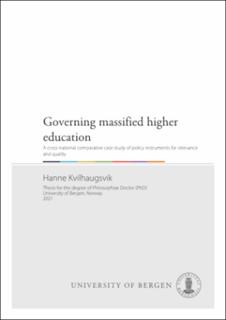| dc.description.abstract | Enrolment in higher education has increased drastically in the past decades, changing higher education from an elite phenomenon to a norm, or right, for major parts of the population. This entails a shift in higher education governance, from managing expansion to consolidation and steering of massified and more integrated higher education systems. As part of this, higher education policies have begun to attend to a wider range of considerations, such as the profile and dimensioning of study programmes, and the relationship to the world of work. In this thesis, I study three policy instruments for quality and relevance in study programmes, namely learning outcomes, employer panels, and quality assurance (QA) systems. These instruments have often been studied in terms of corporatization and New Public Management-inspired reforms of higher education. However, the instruments have varied backgrounds and are connected to several reform agendas. The thesis highlights distinct features of politico-administrative regimes and higher education governance in the Nordic context, where instruments for relevance and quality can be understood as shaped by multiple waves of reforms, welfare state ideals, and traditions for coordination with employers.
The thesis asks how policy instruments are shaped in massified higher education systems. To study this, I use a historical-institutionalist approach with an emphasis on contextual features, ambiguous instruments, and opportunities for several groups of actors to participate. Path dependencies and gradual institutional changes are also central concepts which I use to explain how instruments are shaped in different contexts. I draw on literature on politico-administrative and welfare state regimes, as well as features of the political economy. The articles use material from documents and interviews with university leadership, administrators, academic staff, and students.
The thesis includes four articles, which present comparative case studies of policy instruments in Denmark and Norway in the 2010s. The first article asks how learning outcomes are shaped in professional and disciplinary study programmes. The article is based on a comparative case study of three disciplinary contexts at two Norwegian higher education institutions. The empirical material for the article consists of documents and interviews. The cases show the introduction of learning outcomes as a process involving several levels and groups of actors. A main finding is that learning outcomes were shaped through path dependent processes, leading to distinct versions of the instruments. The cases illustrate layering processes and temporal sequences, as well as ambiguities in the purpose and implications of using learning outcomes.
The second article studies the introduction of learning outcomes within one disciplinary context. The article asks why learning outcomes were introduced in a disciplinary context, and how they were translated in relation to disciplinary traditions and contextual characteristics. The article presents a comparative case study of learning outcomes in two study programmes representing the two main traditions in Norwegian engineering. The material consists of documents and interviews. The findings show that the introduction of learning outcomes was distinctly shaped by both the disciplinary traditions and the institutional context. Learning outcomes are studied as a circulating ‘master idea’ and the cases present layering processes and multiple understandings of the instrument. The article also illustrates challenges in the use of the instrument, as there are few changes in teaching and information practices.
The third article studies cooperation between higher education and the world of work on study programmes. The article compares four employer panels from one Danish and one Norwegian university, which mainly cover professionally oriented and technical study programmes. The article asks how university leadership seek to manage and align different interests in the organization of employer panels, utilizing a material including documents and interviews. The findings show similarities in the background of panels in the two countries and the cases suggest that cooperation can work as a bridging strategy building on established connections to the world of work. However, the findings also show differences in national regulations and in the organization of panels, with quite specialized Danish panels connected to study programmes and broader Norwegian panels established at the institutional level. The article interprets these findings in light of different expansion patterns and features of the political economy. Furthermore, the article highlights university leadership’s opportunities to shape employer panels by managing panels’ representation, agendas, and reporting.
The final article studies the development in QA systems for higher education. Such systems have been established with similar features across countries due to European cooperation and harmonization policies. However, distinct differences remain, even between the Nordic countries. This article compares the development in national systems in Denmark and Norway by studying the composition and use of policy instruments. The article builds on document material and data on decisions. The article finds several similarities, but also notable differences between the countries. The Danish system shows stronger specialization and an emphasis on the study programme level through extensive periodic accreditations. In contrast, Norway has featured one-off institutional accreditations and supervisions. The article analyses these differences as path dependent developments and highlights the instruments’ implications concerning workload in Denmark and the gradual development into a more unitary higher education system in Norway.
Overall, the thesis finds that learning outcomes, employer panels, and QA systems are instruments with multiple purposes, meanings, and uses. The instruments also target several levels and address a wide audience, ranging from policymakers and university leaders to academic staff, students, and employers. I discuss this in terms of ambiguity and opportunities for actors at higher education institutions to shape the instruments, as well as gradual change processes. The thesis considers the three instruments in light of characteristic features of the Nordic context such as welfare state ideals and traditions for coordination, in contrast to common portrayals of the instruments highlighting neoliberalism and corporatization. While these features are particular to the Nordic countries, the findings suggest a shift to stronger steering of relevance and provision in the governance of massified higher education systems. | en_US |

